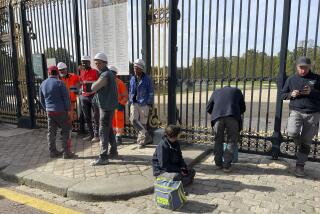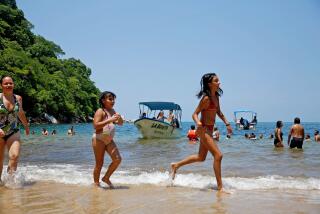State of Emergency Covers Algeria
- Share via
World Travel Watch is a monthly report designed to help you make informed judgments about travel. Because conditions can change overnight, always make your own inquiries before you leave home. In the United States, contact your Passport Agency office; abroad, check in with the nearest American embassy. Africa
Algeria: There has been a military crackdown after rioting by Islamic fundamentalists unhappy with rules governing the first multiparty elections since 1962. A curfew is in effect in Algiers and a countrywide state of emergency will run through October. Several deaths occurred in recent clashes between Islamic fundamentalists and security forces in Algiers. Exercise caution.
Mali: Unrest continues in the Mopti, Timbuktu and Gao regions. Avoid overland travel north of the Niger River, as well as between Gao and the southeast.
Zambia: Unrest is likely if government-promised free elections are not scheduled soon, certainly by October.
Asia
India: Violence has increased in two troubled northern states. Elections were postponed at the last minute, until Sept. 25, in the state of Punjab because of violence by militant Sikh secessionists. Unrest is likely to continue, thus travel here should be avoided. In Kashmir, several foreigners have been kidnaped recently by Islamic militants in an apparent escalation of efforts to obtain autonomy for the state. In one incident, six Israelis were abducted from a houseboat on Dal Lake, probably the most popular tourist attraction in Kashmir, and one was killed. Avoid travel here.
Sri Lanka: Travel to the northern and eastern regions of the country should be avoided due to continuing conflict between government forces and Tamil militants. The western, central and southern regions, including the hilly tea country, are generally calm and unaffected by unrest. There have been reports of Japanese encephalitis and dengue fever both in rural areas and the capital city of Colombo, and malaria is present everywhere outside Colombo. Take appropriate precautions and protect yourself against mosquito bites.
Europe
Yugoslavia: The breakup of Yugoslavia, threatened for months, seems to be well underway with the recent declarations of independence by the republics of Croatia and Slovenia. These moves have led to deadly battles between the Yugoslavian army and Slovenian defense forces along the Slovenia-Croatia border. At the time of writing, Slovenia said it would accept the unilateral cease-fire proposed by the Yugoslav government, but the fighting continued when the Yugoslavian army high command refused to halt its offensive. Defer all travel here until the situation stabilizes.
North America
Mexico: Cholera has been reported in the rural village of San Miguel Totolmaloya, 200 miles south of Mexico City, but health officials claim the outbreak has been contained. Officials believe the disease was brought to Mexico by immigrants from areas in South America suffering from that continent’s first cholera epidemic this century.
Central America
Belize: Street crime has increased in Belize City due to a reported epidemic of crack and cocaine abuse. Be especially cautious on the streets at night.
South America
Peru: The cholera epidemic that began in January continues, and travelers should be especially careful about what they eat and drink, consuming only food that is well-cooked and still hot, fruit they can peel and bottled beverages. There is an increased threat of terrorist acts against U.S.-affiliated targets such as private businesses and American religious organizations, both in Lima and in rural areas. Nonessential travel should be deferred.
Southeast Asia
Philippines: The June eruption of Mt. Pinatubo spread ash as far as Manila, 60 miles to the southeast, and devastated the area around the volcano, including the U.S. military’s Clark Air Base and the city of Angeles. The cleanup is likely to take a long time, and travelers should avoid the area within 20 miles of the mountain.
Oceania
Papua New Guinea: A 9 p.m.-to-5 a.m. curfew is in effect in the national capital district, Morobe Province, and the Western Highlands and Oro provinces. These areas include the cities of Port Moresby, Lae, Mt. Hagen and Popondetta. Most areas visited by travelers, such as Madang and Rabaul, are relatively safe. Crime, however, remains a serious problem in the cities and along the Highlands Highway and the Mt. Hagen to Mendi Highway. In addition, the Baiyer River area of the Western Highlands should be avoided due to banditry. Travel only with experienced tour companies.
For more information on safety concerns in countries you may be visiting, contact the Citizens Emergency Center, U.S. Department of State, Washington, D.C. 20520, (202) 647-5225.
More to Read
Sign up for The Wild
We’ll help you find the best places to hike, bike and run, as well as the perfect silent spots for meditation and yoga.
You may occasionally receive promotional content from the Los Angeles Times.





